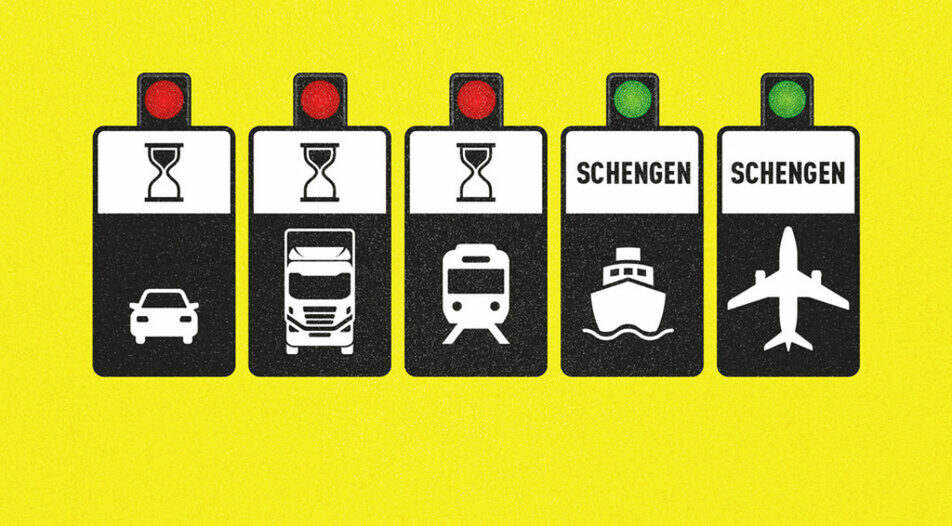- Bulgaria and Romania partially entered the EU's border-free Schengen area.
- While air travel integration is straightforward, questions still linger around maritime transport via Turkey.
- Entry into Schengen by land seems a distant prospect, costing Bulgarian economy 1.2 billion levs in missed benefits annually.
On 31 March, Bulgaria and Romania joined the Schengen area by air and sea, with land borders to open at a later date, by a unanimous member states decision, "considering the relevant technical and operational arrangements at these borders and the current state of cooperation." After negotiations that lasted nearly as long as the two countries' EU membership, and several tense summits at which Austria and the Netherlands alternated blocking efforts, a consensus was finally reached in December.
This, of course, is a modest victory. Full entry, which would liberalize passenger and cargo traffic, normalize situation at the borders, and open new opportunities, is the ultimate goal. Over 1.3 million Bulgarians travel by air to Schengen annually, but nearly 2 million enter Greece by land alone, with almost all goods passing through land borders. Remaining outside the Schengen Zone is impacting Bulgarian producers, traders, and the economy at large, and the country is losing 1.2 billion levs (613 million euro) annually as a result, according to report by the Economy Ministry.
There are still no specific timelines for the land entry, which makes it a challenge for any government.
"The goods transported by air constitute less than 0.3% (or specifically 26,751 tons) of all goods traded between Bulgaria and Schengen countries," concludes the report. This renders the benefits of partial Schengen access insignificant for trade in goods.
What is considered water transport?
An important clarification made by the European Commission to Capital Weekly is that citizens traveling by ferry or ship across the Danube River will continue to undergo passport checks, as the river is considered part of the land borders. "In other words, if you want to travel from Bulgaria's Vidin to Vienna, you're leaving the internal Schengen border by passing through Serbia, and are subject to checks. The same applies if you travel between Bulgaria's Ruse and Romania's Giurgiu," sources from the European Commission commented unofficially.
Regarding sea travel, a European Commission (EC) spokesperson for internal affairs and migration commented to Capital Weekly that "passengers and crew arriving from Bulgaria to Romania (or vice versa) on a ship coming from any other Schengen country will be considered as intra-Schengen maritime transport. Therefore, they will not be subject to border control from March 31, 2024," said the spokesperson. Specifically, any ship arriving from any Schengen port can enter freely and without checks at Bulgarian and Romanian ports. In practice, this means that transiting through a third country (Turkey) will not breach Schengen rules.
In addition to citizens, many goods also arrive at/depart from maritime ports. The big question is whether there will be a free corridor for these goods to the EU and whether the land traffic, which continues to be blocked, will be redirected. Comments from the EC clarify that if the vessel is only transiting through Turkey, there should not be checks at Schengen sea ports.
Air travel
As for air travel, the situation is the clearest: at midnight on March 31 to April 1, the border control booths were moved to the area of the airports where the gates for airplanes arriving from or departing to non-Schengen countries are located. Thus, Schengen passengers will not pass through border control booths. The passport control booths for entering the country will be organized in the same way, as announced by Border Police. Sofia Airport has spent 2.5 million levs on preparations for the change, Varna and Burgas airports - nearly 1 million levs in total. Plovdiv airport handles no flights from the Schengen area. The outgoing Minister of Economy, Bogdan Bogdanov, points out that Bulgaria's accession to Schengen and the eurozone is expected to result in a GDP growth of between 3% and 5% cumulatively over the next few years.
- Bulgaria and Romania partially entered the EU's border-free Schengen area.
- While air travel integration is straightforward, questions still linger around maritime transport via Turkey.
- Entry into Schengen by land seems a distant prospect, costing Bulgarian economy 1.2 billion levs in missed benefits annually.
On 31 March, Bulgaria and Romania joined the Schengen area by air and sea, with land borders to open at a later date, by a unanimous member states decision, "considering the relevant technical and operational arrangements at these borders and the current state of cooperation." After negotiations that lasted nearly as long as the two countries' EU membership, and several tense summits at which Austria and the Netherlands alternated blocking efforts, a consensus was finally reached in December.












